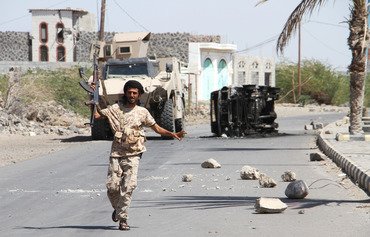By refusing to accept peace proposals presented by the UN, the Iran-backed Houthis (Ansarallah) indicate they are prepared to prolong Yemen's war in order to retain or expand their areas of control, experts tell Al-Mashareq.
UN deputy special envoy to Yemen Moin Shreim left Sanaa on January 10th after five days of consultations with Houthi leaders, who rejected the proposals he submitted, local media reported.
The Iran-backed Houthis do not seek real peace, and have used the talks as a means to stall for time as they attempt to fortify their position on the ground, researcher Rashad al-Sharaabi told Al-Mashareq.
Based on past rounds of negotiations, he said, the Houthis "never honoured any agreement they signed or agreed to", turning dialogue sessions into exercises in futility that yield no results.
"This is what we have seen for more than three years, since their invasion of Sanaa and coup against the state," al-Sharaabi said.
A history of unreliability
In December 2015, the Houthis reneged on agreements reached with the Arab coalition regarding actions that must precede the start of negotiations, he said.
As UN-brokered peace talks began in Switzerland, the Houthis failed to honour a week-long ceasefire in several parts of the country.
Both sides had agreed to the truce, which was to start at noon, but while the Arab coalition halted its airstrikes, the Houthis continued shelling civilian and military targets in Marib, Taez and Daleh provinces.
The Houthis are a militia "that seized cities and hijacked state institutions by force of arms", al-Sharaabi said. "It is difficult for them to accept any peaceful solution that deprives them of the gains they have achieved as a group."
"I think the militia's behaviour will not change, because it does not want to take part in talks as that will cause it to lose some of its power," said media professional and political researcher Abdullah Ismail.
If the Houthis agree to negotiations, the sole purpose would be to maintain their gains and to buy themselves time, he told Al-Mashareq.
Yemen's interests 'non-existent'
The war in Yemen will be resolved either when one party emerges victorious or when a comprehensive national reconciliation agreement is reached, writer Mounir Talal told Al-Mashareq.
This calls for the parties to uphold the Gulf Initiative of 2011, the output of the Comprehensive National Dialogue, and UN resolution 2216 of 2015.
The UN resolution calls on all parties to immediately and unconditionally end violence. It calls for the Houthis to withdraw from all areas seized during the current conflict, relinquish arms seized from military and security institutions, and cease all actions falling within the authority of the legitimate government.
It also imposes sanctions, including a general assets freeze, travel ban and arms embargo, on Abdulmalik al-Huthi, the Houthis' leader.
But the Houthis "carry out Tehran’s instructions and agenda in the region while ignoring the interests of Yemen", Talal said. "And so they deliberately raise the ceiling of their demands and exaggerate their defiance, despite the massive losses they are suffering on all battlefronts."
The Iranians want "a bargaining chip and a pressure card" to use in regional conflicts, he said, noting that Iran's support for the Houthis compels the militia to serve it and implement its agenda in the region.
This is being done at the expense of Yemen's interests, however, which are "virtually non-existent in this war", he said.

![Newly recruited Houthi fighters take part in a gathering in Sanaa to mobilise more fighters to battlefronts to fight pro-government forces in several Yemeni cities, on January 3rd, 2017. [Mohammed Huwais/AFP]](/cnmi_am/images/2018/02/09/11387-yemen-houthi-recruits-600_384.jpg)






